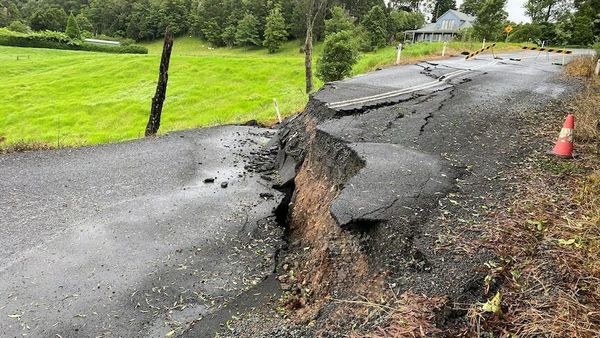People trying to eke out a road to recovery after this year's floods say they've applied for government grants only to find fraudsters have beaten them to the punch.
Andrea Bonotto's burger joint in Lismore's CBD was left in ruins after floodwaters receded, so he decided to open a new business on higher ground.
But when he applied for the second part of an approved small business recovery grant, he was told someone else had already claimed it.
"It was a massive thing for us because without that we wouldn't have had financial capacity to reopen," he said.
While Mr Bonotto's situation has since been resolved by Service NSW, it's not an isolated case.
South Lismore resident Eli Roth said there had been multiple bogus claims made using his home address.
His home was seriously damaged in the floods and most of his belongings were lost.
His visually striking house attracted significant attention, which he said left him vulnerable to fraudsters.
"It's disgusting that people are able to get away with that," he said.
Service NSW rejects more grants than it approves
Four different flood-recovery grants for individuals and businesses were rolled out by Service NSW after this year's flood disaster.
Across those four programs, more than 43,300 grant applications have been received.
To date, 27 per cent have been approved and 50 per cent have been declined.
However, of those still being assessed, 2,705 applications worth a combined total of nearly $30 million are under review for possible fraud.
Service NSW also said it had referred more than 530 suspicious applications to NSW Police for investigation.
Meanwhile, Resilience NSW, which oversees the Disaster Relief Grant, said it had approved about 330 grants from more than 2,440 applications.
More than 230 applicants were declined for not meeting the criteria, and the department said it was waiting on more information for nearly 1,000 applications.
The Rural Assistance Authority (RAA), which aids primary producers, had processed a little under half of the 3,200 grants applications it had received, and approved about 1,100.
It said it had identified 128 cases of fraud across all RAA programs this year.
Fraud prevention 'cannot be a barrier'
There are concerns that people affected by the floods are being caught up in the battle to filter out fraudulent grant applications because they haven't been able to file sufficient evidence of the damage to their home or property.
In a statement, Service NSW said most grants were declined simply because there was not enough information from applicants.
A team of assessors will be sent to Lismore this week to help residents and businesses whose applications have "stalled" to compile the paperwork for their claims.
Lismore Labor MP Janelle Saffin said her office was regularly contacted by flood-affected residents who had been denied grants without an explanation.
"People need to be given reasons and they need to be given an opportunity to then argue their case better," she said.
Ms Saffin she had raised concerns that fraud prevention measures in the grant application assessment process were slowing the flow of money to people who desperately needed it.
"That cannot be a barrier to those who are rightfully entitled to a grant and it needs to be looked at further," she said.
Mr Roth said there needed to be better communication across governments and departments to assess grant claims.
"We had rates bills, electricity bills, utility bills, all that, sent to the house for years," he said.
"It should be so easy to just find my name, find the history of what mail has come to this address."
The state government said it had more than 200 people working to process a record number of grant applications.
"To put that in perspective for people, it's more than four times the number of grant applications that we had resulting from the Black Summer fires," Flood Recovery Minister Steph Cooke said.
But more than three months after the floods, Mr Bonotto said the wait for help seemed to be dragging on.
"When natural disasters have been happening more and more often, we still have no system to deal with them and help people on the ground straight away," he said.










